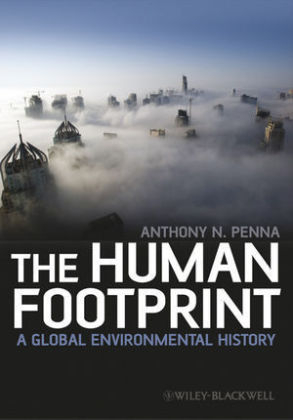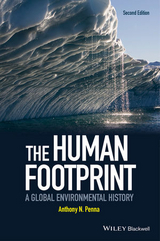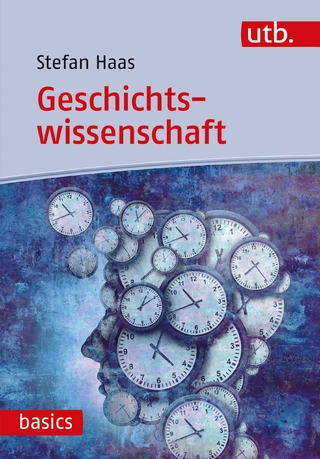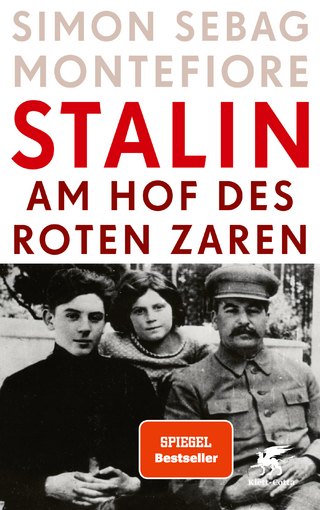
The Human Footprint
Wiley-Blackwell (an imprint of John Wiley & Sons Ltd) (Verlag)
978-1-4051-8771-8 (ISBN)
- Titel erscheint in neuer Auflage
- Artikel merken
Anthony N. Penna has taught at Carnegie-Mellon University and Northeastern University , where he has been teaching North American and Global Environmental history courses since 1990. He is the author of Nature's Bounty: Historical and Modern Environmental Perspectives (1999), and he is co-editor of Remaking Boston: An Environmental History of the City and Its Surroundings (2009).
List of Figures. Acknowledgments. Introduction. The Nature of World History. The Nature of World Environmental History. Earth History and Human Origins. Population Growth and the Rise of Cities. Cities and the Rise of Manufacturing and Industry. World Trade and New World Ecology. Fossil Fuels and Climate Change. 1. An Evolving Earth. Introduction. The Origin of the Earth: From Hot to Cold Planet. Icehouse Planet/Greenhouse Planet. Plate Tectonics, Super-Continents, and Climate Change. The Warming. The Cooling. The Elevation of the Tibetan Plateau and Its Effect on the Global Climate. The Birth, Death, and Rebirth of the Mediterranean Sea and its Hemispheric Environmental Effects. The Impact of the Isthmus of Panama on Global Climate Change. The Mid-Pliocene, Glacial and Interglacial Cycles, and "Modern" Times. 2. Evolving Humanity. Introduction. Climatic Changes and Evolution. Another Effect of the Closing of the Mediterranean Sea. Human Ancestry. The Birth of Human Intelligence. Translating Human Intelligence into Action. Population Migration and Expansion. Homo neanderthalensis vs. Homo sapiens. Early Diets and Their Nutritional Value. The Broad Spectrum - an Economic Revolution. 3. Foraging, Cultivating, and Food Production. Introduction. Early Farming and a Warming Climate. Settlement and Domestication. Early Agricultural Communities. Early Agriculture in China. Early Agriculture in Africa. Early Agriculture in Mesoamerica. Early Agriculture in Europe. World Agriculture During the Age of Manufacture and Industry. The Green Revolution. 4. Populating the Earth: Diet, Domestication, and Disease. Introduction. A Modern Demographic Scenario. The Role of Disease in Calculating Population Size. The Impact of Migration and Settlement on Global Population Growth. The Role of Nutrition on Early population Growth. The Role of Animal Domestication in the Spread of Infectious Disease. Nutrition, Climate Change and Population. A Population Bomb or Not? 5. The Making of an Urban World. Introduction. What Does Urban Mean? Early Urbanization and Its Environmental Effects. Ancient Urbanization. The Origin of Writing. The Impact of Changing Rivers on Environmental Quality. Urbanization in the Indus Valley. China's Early Cities. Ancient Mesoamerican Cities. Early European Cities. 6. Mining, Making, and Manufacturing. Introduction. The Age of Copper and Bronze. The Effects of Ancient Mining on Human Health and the Environment. Mining in the Roman World. The Age of Iron. Iron Making in China and India. Iron Making in pre-Modern Europe. Manufacturing in Colonial America. 7. Industrial Work. Introduction. China and India's Economy. European Hegemony and British Industrialization. Economic Development in China, Japan, and India. Harnessing the Power of Water. Disease, Death and a Public Health Response. The Power of Steam. The Role of Invention and Innovation. Comparing Industrialization in the United States and in Britain. Coal, Iron, and Steel. Industrial Transformation and Global Auto Mobility. 8. Trade and Consumption. Introduction. Global Trading Networks. Distancing Consumers from Producers. Material Goods. Luxury Foods Become Commodities. Tobacco. Sugar. Coffee and Tea. Environmental Effects of Increased Cultivation of Coffee. Conspicuous Consumption. Global Consumption. The Automobile and Electronics in Emerging Markets. 9. Fossil Fuels, Wind, Water, Nuclear and Solar Energy. Introduction. The Eotechnic World: Waterwheels and Windmills. The Paleotechnic World: Energy from Coal. The Neotechnic World: Energy from Oil. The Developing World's Demands for Energy. The Case for Natural Gas: A Neotechnic Energy Solution. The Case for Nuclear Energy: Another Neotechnic Solution. The Case for Renewable Wind and Solar Power: A Return to the Eotechnic. 10. A Warming Climate. Introduction. The Rise and Fall of the Mayan Civilization. The Medieval Warm Period (1000-1300 ce) and the Little Ice Age (1300-1850 ce). Current Global Climate Conditions. The Role of Solar Energy. The Role of the Atlantic Circulation Energy Exchange. The Role of Fossil Fuel Emissions. What Is to be Done? Epilogue. Notes. Index.
| Verlagsort | Chicester |
|---|---|
| Sprache | englisch |
| Maße | 152 x 228 mm |
| Gewicht | 528 g |
| Einbandart | Paperback |
| Themenwelt | Geisteswissenschaften ► Geschichte ► Allgemeines / Lexika |
| Naturwissenschaften ► Biologie ► Ökologie / Naturschutz | |
| ISBN-10 | 1-4051-8771-9 / 1405187719 |
| ISBN-13 | 978-1-4051-8771-8 / 9781405187718 |
| Zustand | Neuware |
| Haben Sie eine Frage zum Produkt? |
aus dem Bereich



